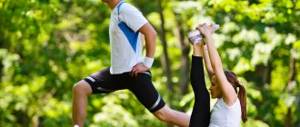In this article we will conduct a real battle and find out what is better – running or walking. It is known that both sports exercises are beneficial for health - they promote weight loss, strengthen the body, and tone muscles. And yet, what is better to choose, and can one replace the other? This question really interests a lot of people.
Both exercises fall into the cardio category. It would seem that the same groups of muscles and joints are involved. But the effect on the body is often different. What is the matter, different degrees of intensity or different physiology? Let's find out!
We will look at each common property of running and walking and find out where it is expressed brighter or weaker. We will also identify the differences, and based on a full analysis, we will conclude in which cases it is better to choose one and in which another.
Fundamental differences
To better understand the opinion of experts on the topic of what is more useful – running or walking, let’s identify the points in which these sports disciplines differ radically:
- Number of muscle groups involved.
When we walk, the muscles of the lower leg and stabilizer muscles work mainly. The hips, buttocks and upper shoulder girdle are weakly involved. When we start running, the triceps, quadriceps, gluteal muscles, abs, shoulders and chest are included in the work.
If you use walking instead of running, the complex load on the muscles will be minimal. Jogging, on the contrary, will force the muscles of almost the entire body to work.
- Anatomy of movement
The answer to the question of whether walking can fully replace running is no, since the two exercises have completely different anatomy. In essence, walking is a much lighter version of running. During it, there is no flight phase, when the body is completely lifted off the ground for a split second and is in the air. When running, the body constantly jumps and pushes, which increases the load on the joints.
- Effect on pulse and heart rate
Many people are interested in what is better for health – running or walking. From a medical point of view, the latter is preferable for people in poor physical condition, recovering from injuries or the elderly. The race requires greater energy expenditure, exhausts the body more, has a greater impact on the pulse and heart rate, and therefore is recommended for healthy people with good physical fitness.
If we look at purely fundamental differences, that’s all. Next, in order to determine what is more effective, running or walking, we will consider the general properties and the degree of their expression.
Should you run or walk to lose weight?
The effectiveness of the exercise for weight loss largely depends on the intensity. At least that's what was thought until recently. But it turns out that the rate of fat burning is affected not only by the intensity, but also by the regularity of movements.
Sports doctors, together with professional fitness trainers and volunteers, conducted a study to study which is better for losing weight: running or walking? Despite the inconsistency of the final results, they are worth paying attention to, as they contain one interesting fact.
The researchers divided all the volunteers into 2 groups. Each group performed its own task, which differed from the other only in the method of movement (walking or running), and the completion time remained the same.
At the same time, it was important to perform the task in the optimal heart rate zone, which is calculated using a simple formula: (220 - age) * 60 and 70% - the resulting 2 numbers will be the optimal zone.
The first group jogged 3 times a week for 1 hour. In this case, an important condition was to choose a pace that would be almost constant throughout the entire run.
The second group walked with the same frequency and duration. Again it was necessary to keep the pace.
The result of the study was very contradictory. So, in 60 minutes of continuous running at the same pace, on average, the subject spent about 550 calories, of which 50% was fat. Those subjects who walked spent about 350 calories, but burned 65% of the total fat burned.
To sum it up Beguza calculated how many grams of fat are burned during an hour of running and walking.
In 1 hour of running, an average of 30.5 grams of fat is burned. During the same time when walking, the body expends about 25.3 grams of fat.
We can conclude that more fat tissue is burned during running than when walking during the same time. However, how big a difference is 5 grams? If there are no contraindications, then running will be more productive for weight loss than walking, but only by 15%.
Effect on the nervous system
It's no secret that a good run helps relieve stress, unwind, and “escape” from approaching depression. Walking also energizes you and has a positive effect on your mood. But when you run, stress and negativity are replaced by load, and while walking - by peace and relaxation. Yes, you can also get very tired from walking, but still, you will have the strength for introspection, making plans, and emotional calm. But which method of disposal is best for you specifically – choose for yourself.
Weight loss
To figure out what is more beneficial, running or brisk walking for health and weight loss, let's look at how fat is burned during physical activity. In order for excess weight to begin to go away, a person must spend more calories than he consumes. During exercise, the body first draws strength from glycogen accumulated in the liver. When the latter runs out, it turns to accumulated fat reserves.
We have already said that running is a more energy-intensive sport, and therefore glycogen will be depleted for it much faster than walking. In other words, you can lose weight by running and walking. It will just take much longer to walk.
On the other hand, many people should not run, for example, pregnant women, the elderly, the obese, or those with joint diseases. That is why walking is better for them than running, because the latter, on the contrary, can cause harm to health.
Which is safer for your health?
In this section we will tell you why walking is better than running for people with poor health, in particular with sore joints or diseases of the cardiovascular system. In the same category we will include overweight patients, expectant mothers and elderly citizens.
While jogging, as we wrote above, the joints and the entire musculoskeletal system experience enormous stress. The cardiac system is stimulated in the same way. Walking involves a more gentle load, and therefore for this category of people it will be better.
Race walking - contraindications
Although the benefits of race walking are obvious, this sport still has contraindications. You cannot do race walking:
- during significant breaks in training;
- for injuries to the shoulder joints and arms;
- if race walking actively engages muscles;
- with flat feet;
- during hypertension;
- after abdominal surgery;
- with heart failure;
- if there is a network of infection and illness accompanied by fever;
- with anemia;
- in the presence of coronary insufficiency;
- during degenerative changes in the spine and joints.
Which is better to choose?
When considering whether fast walking or slow running is better, know that both types will benefit the body. When making a choice, consider the following parameters:
- Health status;
- Age of the athlete;
- Level of physical fitness;
- The presence of diseases of the musculoskeletal system, respiratory or cardiovascular system, recent injuries or surgical interventions.
In the end, if you are in poor physical shape, no one bothers you to start with walking, then speed up and, over time, start running. In some situations, one sport is quite capable of replacing another - temporarily or permanently.
We have already answered why fast walking is better than running; during it, a person does not jump, which means he does not loosen his joints. However, if you do not have any pathologies, you are absolutely healthy, young and energetic, what questions might there be? Go for a run, and not just an easy one, but with an increase in strength!
Also, start from your goal - if you want to lose weight, it is better to run or walk uphill. That is, a load that will force you to spend more energy. If you just want to strengthen your immune system and tighten your muscles, take long walks at a brisk pace, certainly in a green park, away from highways. Clean air and a beautiful environment have a positive effect on the psycho-emotional background, which is very useful for pregnant women or people exposed to stress.
Don't joke with your health. When choosing what is healthier for a sick heart, running or walking, it is, of course, better to lean towards the gentle option. Control the situation and do not force your body to work for wear.
Well, it’s time to take stock and finally find out what is more effective, running or fast walking.
Pros and cons of running
According to experts, if you follow technical rules while running, your health will improve. During jogging, blood flow is ensured throughout the body and oxygen saturation is active.
Benefits of running:
- improves metabolic processes in the body;
- accelerates blood circulation;
- helps to get rid of excess weight, i.e. – lose weight;
- provides an opportunity to find like-minded people in this hobby;
- increases self-esteem;
- cheap activity at cost;
- helps relieve stress;
- strengthens the body;
- maintains slimness;
- develops endurance.
Disadvantages of running:
- Not suitable for everyone, there are health restrictions;
- with excessive or improper loads it can cause problems with joints and tendons.
To know which is healthier, walking or running, you need to take into account many nuances:
- general state of human health;
- his physical fitness;
- temperament;
- Lifestyle.
Results
We analyzed the differences and similarities of both sports. What conclusions can be drawn?
- Running uses a larger number of muscles, requires greater energy expenditure, and its physiology is more complex;
- Both sports have a positive effect on the nervous system, although in different ways;
- To lose weight, it is better to run, however, if your health does not allow it, you can walk. This also helps burn fat, although not as quickly;
- Both exercises strengthen muscles, have a beneficial effect on metabolic processes, and improve health;
- Walking is safer for the musculoskeletal system and joints. It has less impact on the pulse and heart rate, and accordingly, it overloads the heart less;
In conclusion, let's say this: walking is a more gentle form of athletics than running. Provided a competent approach and systematic approach, both disciplines are quite capable of bringing the athlete to his goal. Soberly assess your situation, carefully re-read our article and make a choice. Focus on the result, and it will not keep you waiting.
How long and where to walk?
In order for walking to bring maximum benefits, you need to walk correctly. It is better to refrain from training on a full stomach. You need to walk with a straight back, and to avoid shortness of breath, it is better to remain silent. If shortness of breath appears, the pace should be slowed down, but not stopped. You can breathe through your mouth if the air is clean and not cold.
Walking along polluted and noisy streets will not bring pleasure. Therefore, it is recommended to choose quiet alleys, parks, small streets where cars rarely pass. Ideally, of course, it is better to walk in a forest belt, but not everyone has this opportunity.
It’s not bad to walk on a not entirely level road that has slight ups and downs.
As for the question of how much you need to walk a day, it depends on the person’s preparedness. If you are just starting to practice walking, walking for 15-20 minutes is enough. This must be done daily and the distance must gradually be increased. Doctors recommend covering a distance of 4 km per day. At average speed, this will take 1.5-2 hours.











